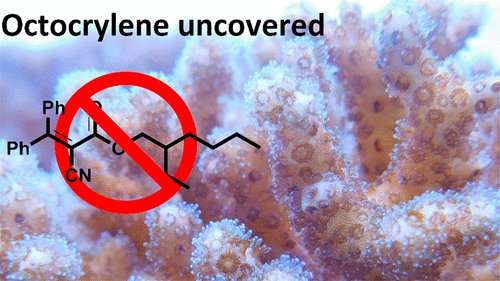Sunscreen and cosmetics compound may harm coral by altering fatty acids

Although sunscreen is critical for preventing sunburns and skin cancer, some of its ingredients are not so beneficial to ocean-dwelling creatures. In particular, sunscreen chemicals shed by swimmers are thought to contribute to coral reef decline. Now, researchers reporting in ACS' journal Analytical Chemistry say that one such chemical, octocrylene (OC), which is also in some cosmetics and hair products, accumulates in coral as fatty acid esters that could be toxic to the marine organism.
According to several research studies, up to 14,000 tons of sunscreen end up in the world's oceans every year. To protect coral reefs, the state of Hawaii recently banned sunscreens containing oxybenzone and octinoxate, two chemicals known to harm coral, with the law set to take effect in January 2021. Another substance, OC, can be found in cosmetics such as hair sprays and conditioners, as well as sunscreens. Although OC is toxic to coral at high concentrations, Didier Stien, Philippe Lebaron and colleagues wondered how it would affect coral at levels more likely to be encountered in the environment.
To find out, the researchers exposed coral to OC at various concentrations for a week. They found that the coral was sensitive to the compound at concentrations of 50 micrograms per liter and greater, which is about 10 times higher than levels measured in the ocean. OC accumulated in the coral as fatty acid conjugates, which may interfere with the organism's metabolism. The team also detected increased levels of acylcarnitines in the exposed corals, which are produced under conditions of abnormal fatty acid metabolism and mitochondrial dysfunction. The researchers say that levels of OC in the ocean might have been underestimated previously because these measurements did not take into account OC fatty acid esters.
More information: Didier Stien et al. Metabolomics Reveal That Octocrylene Accumulates in Pocillopora damicornis Tissues as Fatty Acid Conjugates and Triggers Coral Cell Mitochondrial Dysfunction, Analytical Chemistry (2018). DOI: 10.1021/acs.analchem.8b04187
Journal information: Analytical Chemistry
Provided by American Chemical Society




















